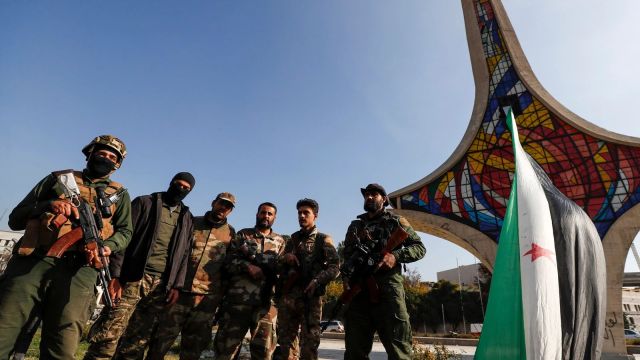Syria holds first elections since Assad’s fall, but no public vote cast
Elections were postponed in Sweida province and in areas controlled by the Kurdish-led Syrian Democratic Forces because of tensions with Damascus.
 Security forces were stationed around polling centres across the country. (File Photo)
Security forces were stationed around polling centres across the country. (File Photo) Syria held its first parliamentary elections on Sunday, nearly a year after a rebel-led offensive removed longtime leader Bashar Assad, the Associated Press (AP) reported.
The new 210-member People’s Assembly will help draft a new elections law and constitution as part of the country’s political transition after more than a decade of conflict.
Security forces were stationed around polling centres across the country. Inside, members of the electoral colleges cast their votes in sealed boxes, which were later opened and counted in front of candidates, journalists and observers, according to AP.
There was no direct public vote in this election. Two-thirds of the seats were chosen through province-based electoral colleges, while one-third will be appointed by interim President Ahmed al-Sharaa. The new parliament will serve for 30 months while preparing for future nationwide elections.
Elections were postponed in Sweida province and in areas controlled by the Kurdish-led Syrian Democratic Forces because of tensions with Damascus.
After visiting a polling station in the capital, President al-Sharaa said, “There are many pending laws that need to be voted on so that we move forward with the process of building and prosperity.” He added, “Building Syria is a collective mission, and all Syrians must contribute to it,” according to AP.
Critics say the election process falls short of a full democracy, arguing that the electoral college system may benefit well-connected candidates. But others viewed it as a sign of gradual progress.
In Damascus, 490 candidates competed for 10 seats, with 500 electoral college members voting. One of them, Dr. Lina Daaboul, said she first declined to take part but later agreed after learning her role.
“I studied the profiles of many candidates and attended meetings. I called people to ask about the candidates and their histories,” she told AP. “This is the first time I’ve ever voted in my life. I’m happy, and I don’t mind standing in line for a long time.”
Election officials said a nationwide popular vote is not yet possible because many people remain displaced and lack identity documents.
Lara Eezouki, a member of the national elections committee, said the new assembly includes members from all sects and regions. “It’s the first time in Syria’s history that the ballot box truly rules when the results are not prearranged,” she said.
Rim Yajizi, a lawyer and candidate in Damascus, told AP that this vote allowed open discussion. “It’s enough to mention the freedom factor, the electoral statements and the debates we watched and participated in. We had never seen anything like it before.”
In Aleppo, 220 candidates ran for 14 seats. Ibrahim Halabi, a 33-year-old former soldier who defected in 2012, said, “This is the first time in our lives we’ve participated in a democratic electoral process without outside pressure.”
In Latakia, once a stronghold of Assad’s Alawite community, three Sunni candidates won seats. One of them, Rola Daya, said internal tensions remain. “Transitional justice is needed so we can move toward civil peace,” she said.
Daya, who fled Syria during the war, told AP she felt “the weight of responsibility grow even larger” after her election. “We need to work to devise legislation and laws that serve our society and our people,” she said.






